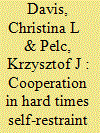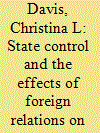| Srl | Item |
| 1 |
ID:
099189


|
|
|
| 2 |
ID:
151155


|
|
|
|
|
| Summary/Abstract |
Hard times give rise to greater demand for protection. International trade rules include provisions that allow for raising barriers to aid industries when they suffer economic injury. Yet widespread use of flexibility measures may undermine the trade system and worsen economic conditions. How do states balance these conflicting pressures? This article assesses the effect of crises on cooperation in trade. We hypothesize that governments impose less protectionism during economic crisis when economic troubles are widespread across countries than when they face crisis in isolation. The lesson of Smoot–Hawley and coordination through international economic institutions represent mechanisms of informal governance that encourage cooperation to avoid a spiral of protectionism. Analysis of industry-level data on protection measures for the period from 1996 to 2011 provides support for our claim that under conditions of shared hard times, states exercise strategic self-restraint to avoid beggar-thy-neighbor policies.
|
|
|
|
|
|
|
|
|
|
|
|
|
|
|
|
| 3 |
ID:
078474


|
|
|
| 4 |
ID:
085685


|
|
|
|
|
| Publication |
2009.
|
| Summary/Abstract |
How do states use economic-security linkages in international bargaining? Governments can provide economic benefits as a side payment to reinforce security cooperation and use close security ties as a source of bargaining leverage in economic negotiations. Domestic political pressures, however, may constrain the form of linkage. First, economic side payments are more likely to be chosen in areas that will not harm the key interests of the ruling party. Second, involvement by the legislature pushes governments toward using security ties as bargaining leverage for economic gains. Evidence from negotiations between Britain and Japan during the Anglo-Japanese alliance of 1902 to 1923 supports the constraining role of domestic politics. Economic-security linkages occurred as Britain gave favorable economic treatment to Japan in order to strengthen the alliance. Economic competition between the allies, however, made it difficult for Britain to grant asymmetrical economic benefits. In tariff negotiations where business interests had more influence in the domestic policy process, the alliance was used as leverage to force reciprocity.
|
|
|
|
|
|
|
|
|
|
|
|
|
|
|
|
| 5 |
ID:
163269


|
|
|
|
|
| Summary/Abstract |
How does economic interdependence shape political relations? We show a new pathway to support a commercial peace in which economic interdependence changes strategies for conflict management. The uncertainty arising from political disputes between countries can depress trade flows. As states seek to protect trade from such negative effects, they are more likely to bring their disputes to legal venues. We assess this argument by analyzing why countries bring cases to the International Court of Justice (ICJ). Using data on 190 countries from 1960 to 2013, we find that countries are more likely to file ICJ cases against important trading partners than against states with low levels of shared trade. We conclude that economic interdependence changes the incentives for how states resolve their disputes.
|
|
|
|
|
|
|
|
|
|
|
|
|
|
|
|
| 6 |
ID:
164159


|
|
|
|
|
| Summary/Abstract |
Can governments still use trade to reward and punish partner countries? While World Trade Organization (WTO) rules and the pressures of globalization restrict states’ capacity to manipulate trade policies, politicization of trade is likely to occur where governments intervene in markets. We examine state ownership of firms as one tool of government control. Taking China and India as examples, we use new data on bilateral trade disaggregated by firm ownership type as well as measures of political relations based on bilateral events and United Nations voting data to estimate the effect of political relations on import flows since the early 1990s. Our results support the hypothesis that imports controlled by state-owned enterprises are more responsive to political relations than imports controlled by private enterprises. This finding suggests that politicized import decisions will increase as countries with partially state-controlled economies gain strength in the global economy. Extending our analysis to exports for comparison, we find a similar pattern for Indian but not for Chinese exports and offer potential explanations for these differential findings.
|
|
|
|
|
|
|
|
|
|
|
|
|
|
|
|